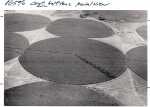Republican River water, reservoirs

The Southwestern Nebraska Industrial Association had a committee in 1903 on Reservoirs and Irrigation. The Association was doing all it could to promote the cultivation of sugar beets and was trying very hard to have a sugar beet factory located in Southwest Nebraska. They were frustrated because under the law of the time localities such as ours were still looked on as being uninhabited. "So here in the Republican valley, where we are trying to place on its feet an industry that will benefit all the people of the country, the farmer in particular, we need to look for nothing advantageous from the operations of a law, which if properly framed would make it possible to impound the vast volume of water now running to waste in the Republican river and hold it for use in the summer months, when it would water all the farms from 'Zucoth to Daradtha' and prove of inestimable value."
The reservoir article in the February 13, 1903, Tribune concluded with "It only remains for Uncle Sam to do his duty in the premises and provide us with the necessary reservoirs, and not expend in the Rocky Mountains all the money secured on the plains by the sale of public lands. Give us some of our deserts in this respect and we will soon blossom like the rose."
In the February 27, 1903 Tribune the sale of 465 of the 500 shares of McCook Irrigation and Waterpower Co. stock to W.H. Ferguson, a Hastings elevator man and J.E. Kelley of McCook. The men owned "a thousand acres of splendid land, just south of the city, which is all under the ditch, land enough of their own to make the ditch profitable."
Mrs. Sophia Griswold left a boy and a girl alone in the world when she died in South McCook on February 13, 1903. Mr. Griswold had not lived with the family for some time and she had not corresponded with any of her family for 12 years. Two of Mrs. Griswold's brothers came and hopefully took the boy and girl home with them. Mrs. Griswold's funeral was held in the South McCook Methodist Church.
They called it kidnapping when 23-year-old George Franklin of Blakeman, Kansas took 17-year-old Miss Pearl Smith, also of Blakeman, for a buggy ride and didn't bring her back. He headed north to Nebraska, held her at "a place called Church House and held her against her will until 5 a.m. trying to force her to consent to marry him", then drove on to Trenton. Miss Smith had him arrested at Trenton. "The Smith and Franklin families are highly respected and Miss Smith is a popular and charming young lady. Franklin had kept company with Miss Smith and she quit him some time ago."
Since George W. Norris had been elected to the House of Representatives in Washington, a successor had to be named to take over his judicial duties. Gov. Mickey appointed Richard C. Orr of Hayes Center as Judge Norris' successor on the bench of the fourteenth judicial district.
Drug use was being discussed in the newspapers of 1903. "The most dangerous feature of the abuse of drugs is that once established in a community it becomes almost ineradicable. A few of the victims are cured, but the others do not escape its clutches until they die, and meanwhile the vice is steadily securing new recruits. There is reason to fear that if left unchecked the indulgence in cocaine, opium, chloral and similar drugs might become as great a menace as drunkenness."
Two items were especially interesting in the Redwillow column in the February 27, 1903 McCook Tribune. "John Helm and others are trying to centralize the five school districts adjoining district No. l. The valuation is sufficient, but the number of pupils is short." School consolidation because of a shortage of students...in 1903.
"The Willow bridge is now so far advanced that teams can cross it. This gives us a much better road to McCook than the old road down the north side of the river."
According to the March 6, 2004 McCook Tribune, the county physicians for the year 1903 were: First district R.B. Campbell of Lebanon; Second District, J.M. Brown of Bartley; Third district, W.V. Gage of McCook.
I found a postscript to last weeks' story of the murder of Richard Mitchell in the March 6th Tribune. Ed B. Lincoln, the brother-in-law who went crazy and killed Mitchell had died in the Lincoln asylum. "The deceased had been unconscious from the time of his arrival in Lincoln and his death was expected from lack of nutrition and weakness."
